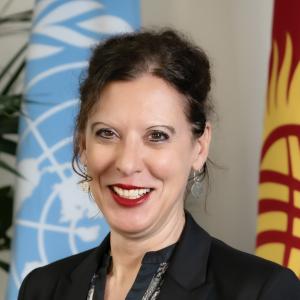Today, we are marking the 30th anniversary of World Press Freedom Day, and its theme: “Shaping a Future of Rights: Freedom of Expression as a driver for all other human rights” could not be more relevant. “This day”, and let me quote the United Nations Secretary-General on the occasion, “highlights a basic truth: all our freedom depends on press freedom”.
In the Universal Declaration of Human Rights (UDHR), whose 75th anniversary the world will commemorate this year, four fundamental freedoms are enshrined: freedom of speech, freedom of belief, freedom from fear, and freedom from want. It is not incidental that freedom of speech comes first: this fundamental freedom is the one that enables all others!
The right to freedom of expression, the right to access information, allow us to seek, receive and impart information, ideas, concepts, and beliefs across borders and cultures.
And in this, media and journalists play an essential role: they help verify and disseminate facts, they create spaces for ideas to be debated and for the voiceless to be heard, and they render complex matters understandable for the public.
Freedom of expression and freedom of the media not only form the bedrock of democracy and the lifeline needed for other rights to be protected, take root and flourish, but they are also key enablers for economic growth and prosperity, for innovation and creativity.
In Kyrgyzstan, journalists and media outlets have played critical roles in this regard.
For example, the media's coverage of elections in Kyrgyzstan, especially televised live election debates by different media platforms was a key factor in the establishment of a culture of open and issue-based argumentation. Kyrgyz journalists have shown dedication in their reporting, keeping the public informed about candidates, their policies, and the electoral process itself, which contributed both to informed decision-making of millions who casted their vote and to strengthening democratic practices and institutions.
Free press is vital for anyone living in rural locations to stay informed of developments that impact their lives. A farmer who wants to know what changes are coming to livestock registration, farm subsidies or whether new water regulations or pastureland management will affect their work, can turn to the media for answers.
Access to the internet and social media outlets is also a vital component in Kyrgyzstan's development, especially in this era of unprecedented technological transformation. Social media is an essential channel for the sharing of ideas, tapping into the brightest minds and talents, whether they are in remote Batken or Naryn, in many areas including education, farming, the creative economy, culture or sports.
We also saw on many occasions how diverse and inclusive media gave a platform to marginalized groups, such as women and youth in rural areas, religious and ethnical minorities, and people with disabilities, promoting social justice and equality.
These very few examples illustrate how freedom of expression, the free flow of information and freedom of the media are preconditions for the realization of Kyrgyzstan’s long-lasting development where all Kyrgyz can materialize their potentials and dreams.
Let us therefore together cherish and nourish these freedoms!
The UN System stands ready to continue to provide necessary support to uphold the rights enshrined in the Universal Declaration of Human Rights for all people of the Kyrgyz Republic.


















